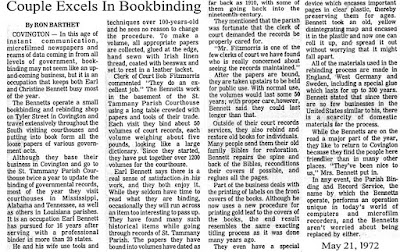The article had to do with bookbinding and a Covington couple who traveled the roads from one courthouse to the next, binding and repairing the binding of the old public record books. It was a fascinating art form that they had pursued as a career, and back in the days before massive computer storage, bound books were the only form of "permanent records."
Click on images below to see enlarged versions.
Anyway, here's the article and the tribute to bookbinding as it was practiced over the past hundred or so years.
Couple Excels In Bookbinding by Ron Barthet
In this age of instant communication, microfilmed newspapers and reams of data coming in from all levels of government, bookbinding may not seem like an up-and-coming business, but it is an occupation that keeps both Earl and Christine Bennett busy most of the year.
The Bennetts operate a small bookbinding and rebinding shop on Tyler Street in Covington and travel extensively throughout the South visiting courthouses and putting into book form all the loose papers of various government acts.
Although they base their business in Covington and go to the St. Tammany Parish Courthouse twice a year to update the binding of governmental records, most of the year they visit courthouses in Mississippi, Alabama and Tennessee, as well as others in Louisiana parishes. It is an occupation Earl Bennett has pursued for 16 years after serving with a professional binder in more than 20 states.
He and his wife use tools and techniques over 100-years-old and he sees no reason to change the procedure. To make a volume, all appropriate papers are collected, glued at the edge, hand sewn with Irish linen thread, coated with beeswax and set to rest in a leather jacket.
Clerk of Court Bob Fitzmorris commented "They do an excellent job." The Bennetts work in the basement of the St. Tammany Parish Courthouse using a long table crowded with papers and tools of their trade. Each visit they bind about 50 volumes of court records, each volume weighing about five pounds, looking like a large dictionary. Since they started, they have put together over 1200 volumes for the courthouse.
Earl Bennett says there is a real sense of satisfaction in his work, and they both enjoy it. While they seldom have time to read what they are binding, occasionally they will run across an item too interesting to pass up. They have found many such historical items while going through records of St. Tammany Parish.
The papers they have bound into volumes have dated as far back as 1910, with some of them going back into the nineteenth century.
They mentioned that the parish was fortunate that the clerk of court demanded the records be properly cared for. "Mr. Fitzmorris is one of the few clerks of court we have found who is really concerned about seeing the records maintained."
After the papers are bound, they are taken upstairs to be held for public use. With normal use, the volumes would last some 50 years; with proper care,however, Bennett said they could last longer than that.
Outside of their court records services, they also rebind and restore old books for individuals. Many people send them their old family Bibles for restoration. Bennett repairs the spine and back of the Bibles, reconditions their covers if possible, and reglues all the pages.
Part of the business deals with the printing of labels on the front covers of the books. Although he now uses a new procedure for printing gold leaf to the covers of the books, the end result resembles the same exacting titling process as it was done many years ago.
They even have a special device which encases important pages in clear plastic, thereby preserving them for ages. Bennett took an old, yellow disintegrating map and encased it in the plastic and now one can roll it up, and spread it out without worrying that it might fall apart.
All of the materials used in the rebinding process are made in England, West Germany and Sweden, including a special glue which lasts for up to .300 years. Bennett stated that since there are so few businesses in the United States similar to his, there is a scarcity of domestic materials for the process.
While the Bennetts are on the road a major part of the year, they like to return to Covington because they find the people here friendlier than in many other places. "They've been nice to us," Mrs. Bennett put in.
In any event, the Parish Binding and Record Service, the name by which the Bennetts operate, performs an operation unique in today's world of computers and microfilm recorders, and the Bennetts aren't worried about being replaced by either.



